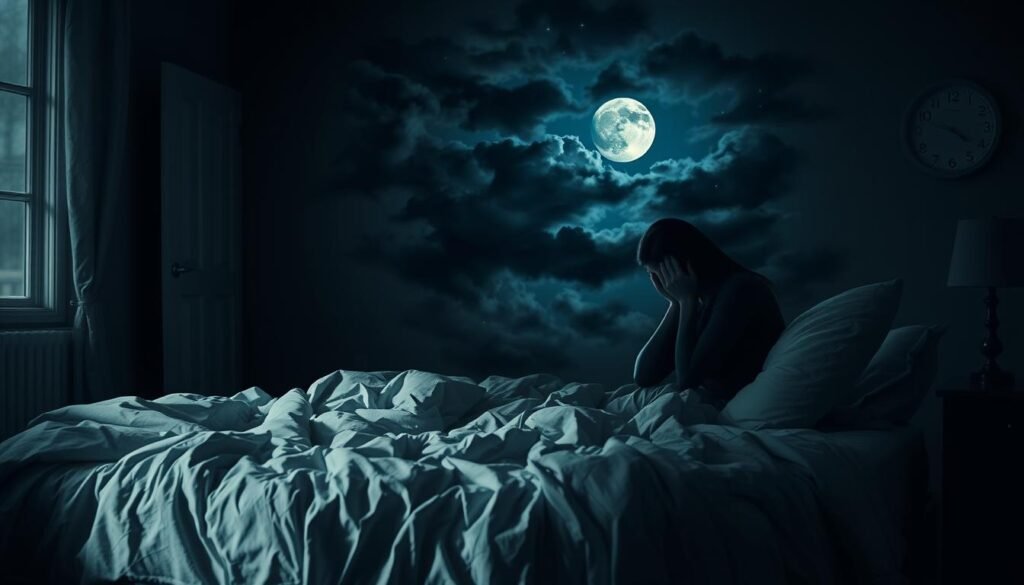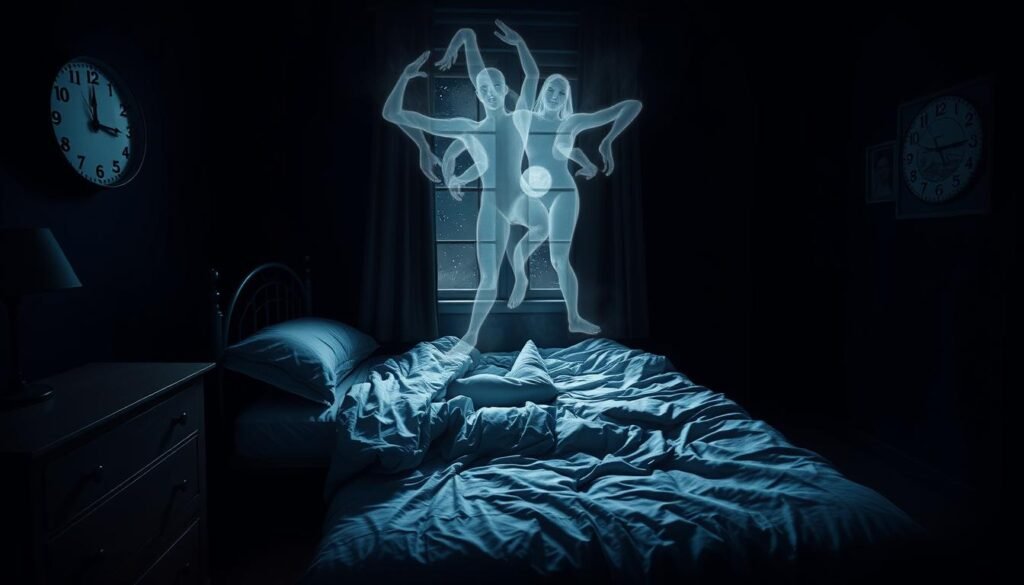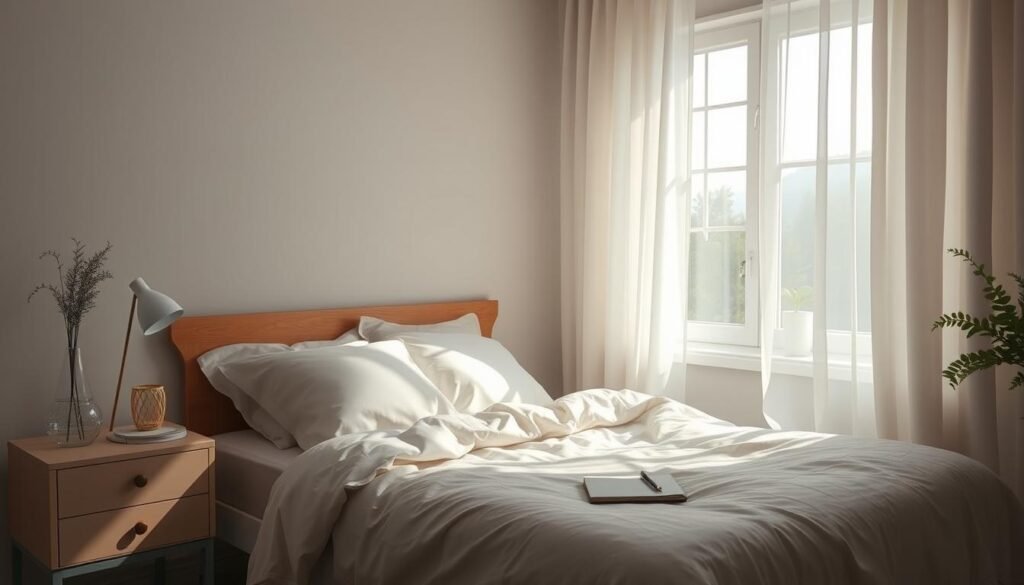Did you know people with insomnia are way more likely to get depression? They’re ten times more at risk than those who sleep well. This fact shows how sleep problems and mental health are closely linked. Today, stress is everywhere. So, it’s vital to know if insomnia might be a depression sign.
About 75% of folks with depression also struggle to sleep. This can start a tough cycle where each issue makes the other worse. It’s crucial to understand this link. This helps in spotting depression early and getting the right treatment. Recognizing these signs and getting help is key for anyone facing sleep issues.
Key Takeaways
- Insomnia significantly increases the risk of developing depression.
- Approximately 75% of depressed individuals face sleep-related challenges.
- Sleep apnea can lead to a fivefold increase in depression risk.
- Improving sleep quality may enhance the chances of depression remission.
- Nearly all respondents with depression report sleep issues impacting their quality of life.
Understanding the Connection Between Sleep and Depression
The link between sleep and depression is quite complex, affecting our mental health deeply. Nearly one-third of adults in the U.S. experience insomnia at some point. Most Americans get less sleep than the 7 to 9 hours recommended, averaging about 6.9 hours nightly. Many people with sleep and depression issues find it hard to manage their emotions.
About 75% of those with depression also have trouble sleeping. Up to 90% of depressed patients report poor sleep quality. Among them, two-thirds suffer from insomnia, which might include trouble falling asleep, staying asleep, or waking up too early. Narcolepsy, another sleep issue, is often linked to depression, suggesting those with narcolepsy might feel more depressed.
Experts stress looking into a patient’s sleep habits when diagnosing depression. A chronic lack of sleep can make depression worse. This shows how vital good sleep is for our emotional health. Poor sleep makes it harder to manage our feelings effectively.
How Sleep Disorders Impact Mental Health
Sleep issues like insomnia and sleep apnea affect mental health deeply. A study with 22,330 adults found one in three had insomnia symptoms. Nearly 20 percent were diagnosed with an insomnia disorder. This was especially noticeable after COVID-19 began.
There’s a strong connection between sleep problems and mental distress. After COVID-19, depression and anxiety spiked, relating to sleep troubles. An alarming 56% of Americans struggled with sleep during the pandemic. For those aged 35-44, the issue affected 70%.
Long-term sleep issues can worsen mental health disorders such as depression and anxiety. Around 40% of people with insomnia also face another mental condition. Among those with depression, 80% suffer from insomnia. This shows how closely tied sleep and mental health are.
Getting enough sleep is crucial; adults need at least 7 hours. Not sleeping enough can impact health, change eating habits, and lead to weight gain. Lack of sleep makes managing mental health more difficult.
Sleep disorders do more than make you tired. Cognitive behavioral therapy for insomnia (CBT-I) is a top treatment for lasting insomnia. It’s key to treat sleep disorders to better mental health outcomes. Healthy sleep habits are vital for overall wellness.
Is Insomnia a Sign of Depression?
It’s crucial to understand how insomnia and depression are linked for the best treatment. Insomnia is a common issue for those with depression. About 75% of depressed people struggle with insomnia, while around 40% of those with insomnia may get depressed. This strong connection between depression and insomnia shows why early help is important.
Statistics on Insomnia and Depression
Sleep problems are a big topic in mental health. Around 15% of people with depression sleep too much. This adds complexity to the insomnia discussion. Not sleeping enough can make depression worse. But it’s not usually the direct cause. Treating both conditions often requires a varied approach.
Exploring the Bidirectional Relationship
The two-way street between insomnia and depression makes diagnosing insomnia tricky. They can each make the other worse. This is why it’s key to look at sleep issues when considering mental health. Treating both usually involves therapy and medicine. Techniques like cognitive-behavioral therapy and meds such as SSRIs and SNRIs can help a lot. This treatment mix can boost well-being and lead to better sleep. Discover more about therapy coping skills and improving sleep.
Common Symptoms of Depression and Sleep Issues
It’s crucial to know the symptoms of depression and sleep problems for early help. Many people struggle with nighttime wakefulness. This means having trouble falling or staying asleep. Such sleep issues can make you feel very tired and worsen depression symptoms.
About 75% of people with depression also have insomnia. These conditions affect each other in both directions. People feeling sad or hopeless often feel very sleepy during the day too. This sadness can make sleep problems worse, creating a tough cycle.
If you have trouble sleeping at least three nights a week for more than three months, it could be chronic insomnia. This might be a sign of a bigger mental health issue. So, it’s important to deal with sleep problems to help manage your mental health.

The Role of Sleep in Mood Disturbances
Sleep is key for emotional health and stable moods. Not getting enough sleep can cause mood problems. The link between sleep loss and feeling irritable and anxious is strong.
This can make daily interactions and coping hard.
Sleep Deprivation Effects on Mental Health
Lack of sleep can upset emotions a lot. People might get irritable, find focusing hard, and feel more stressed. These emotional ups and downs are a big risk for more serious mental health issues.
An alarming fact is that insomnia and major depression are closely linked. Up to 88% of those with major depression have sleep issues. Bad sleep can triple the risk of getting major depression.
Psychological Factors Contributing to Insomnia
Many psychological issues can cause insomnia, affecting how we manage our emotions. Anxiety, stress, and trauma are big reasons. For instance, around 40% of people with insomnia also have anxiety disorders.
These issues can make mood problems worse, leading to both mood disorders and more sleep issues. It’s important to tackle these psychological factors to sleep better and feel emotionally stable. For more on sleep and emotional health, check out this resource.
Depression Symptoms Associated with Sleep Disorders
Many depression symptoms go hand in hand with sleep issues. This shows how connected mental health and sleep are. About three-fourths of people with depression also have trouble sleeping. This shows how important it is to look at sleep problems when dealing with depression.
About 40% of young adults with depression feel very sleepy during the day. For older adults, especially women, about 10% have the same issue. This makes treating depression more complex.
People with sleep problems might feel very tired, can’t focus, and may eat more or less than usual. Insomnia, in particular, can lead to thoughts of suicide. This makes finding good treatments crucial. Sleep problems often don’t go away easily, making depression harder to treat over time.
People who have had insomnia but not depression could be more likely to get depressed later. This suggests we should deal with sleep issues early. They might trigger or make depression worse.
Insomnia can change sleeping patterns, like causing more REM sleep and less deep sleep. These changes can make depression symptoms worse. The effect of not getting enough sunlight in winter can also lead to more depression symptoms.
The stats show how sleep and depression are closely linked. Consider this:
| Statistic | Detail |
|---|---|
| Prevalence of Insomnia | Approximately 88% report insomnia as a common complaint. |
| Major Depressive Disorder | More than 90% suffer from sleep disorders. |
| Risk of Hypersomnia | Reported in about 27% of major depression cases. |
| Daytime Sedation | Occurs in about 15% of depressed patients. |
| Insomnia’s Predictive Nature | Strongly predicts the development of depression. |
To better understand these links, we must explore the connection between sleep and mental health. Managing sleep issues well can improve people’s lives and prevent depression from coming back. For more, read this article on treating sleep problems to prevent depression.

Insomnia Causes: Understanding Your Triggers
It’s key to understand the causes of insomnia to tackle sleep issues well. Sleep problems can come from many factors that affect sleep or cause stress. Knowing what affects you is the first step in creating a plan that works.
Identifying Underlying Conditions
Some find their insomnia is due to health problems. Conditions that can disturb sleep include:
- Sleep apnea
- Chronic pain
- Gastroesophageal reflux disease (GERD)
- Asthma
- Mental health disorders such as anxiety and depression
Knowing these conditions allows for a broad approach. It addresses both symptoms and their deeper causes to better sleep.
Life Stressors and Sleep Disruptions
Stress in life is a big factor in starting or keeping up insomnia. Things that can mess with sleep include:
- Relationship conflicts
- Work-related stress
- Financial issues
- Major life changes, such as moving or job loss
These stressors can make your mind too alert to sleep. Short-term sleeplessness can happen with sudden stress. Long-term stress might lead to ongoing insomnia, making good sleep hard.
Dealing with health issues and stress triggers is vital in fighting insomnia. Seeing the link between them helps make plans for better sleep.
| Insomnia Causes | Description |
|---|---|
| Medical Conditions | Includes sleep apnea, chronic pain, asthma, and GERD. |
| Mental Health Disorders | Conditions such as anxiety and depression that hinder sleep. |
| Life Stressors | Work stress, relationship issues, financial problems. |
| Environmental Factors | Noisy surroundings, uncomfortable temperatures disrupting sleep. |
Treatment Options for Insomnia and Depression
Having both insomnia and depression is hard, but there are good treatments available. It’s important to treat both at the same time. This is because they can make each other worse, making treatment more difficult.
Cognitive Behavioral Therapy for Insomnia (CBT-I)
Cognitive behavioral therapy, or CBT-I, works well for long-term sleep issues. It helps by changing the thoughts and actions that can cause trouble sleeping. Studies show it can ease insomnia symptoms and help with depression.
CBT-I is often the first choice for treating both insomnia and depression.

Medications for Managing Depression and Sleep Problems
Medications are another way to treat insomnia and depression. There are different types of sleep meds, like benzodiazepine and non-benzodiazepine receptor agonists. Some antidepressants, especially tricyclic antidepressants and trazodone, can also help you sleep because of their calming effects.
Choosing the right meds needs careful thought about symptoms, personal choices, and possible side effects. Working with healthcare providers ensures a plan that fits individual needs well. This plan can improve sleep and mental health.
| Medication Type | Examples | Main Use |
|---|---|---|
| Sleep Medications | Benzodiazepine receptor agonists | Treat insomnia |
| Non-benzodiazepine receptor agonists | Treat insomnia | |
| Melatonin receptor agonists | Treat insomnia | |
| Antidepressants | SSRIs, SNRIs | Treat depression |
| Tricyclic antidepressants | Treat both insomnia and depression |
Improving Sleep Quality to Enhance Mental Health
Making sleep a top priority is key for better mental health. Good sleep habits help you rest well. They also cut down on insomnia signs and improve your mental state. It’s crucial to make your bedroom a place that helps you sleep.
Tips for Better Sleep Hygiene
To sleep better, follow these recommended habits. They include:
- Go to bed and wake up at the same time daily.
- Have a calming bedtime routine without screens.
- Make sure your room is dark, quiet, and cool.
- Avoid caffeine and alcohol before bed.
- Use comfy bedding that makes you feel relaxed.
Practical Strategies to Combat Insomnia
To fight insomnia and boost your sleep and mental health, try these tips:
- Get moving for at least 30 minutes on most days.
- Use mindfulness like meditation or deep breathing to relax at night.
- Keep naps short and avoid them late in the day.
- If sleeping issues don’t improve, see a professional. Cognitive behavioral therapy might help.
Conclusion
It’s vital to know how insomnia and depression are linked. This helps in making effective treatment plans and improving life quality. Up to 84% of adults with depression have sleep problems. This shows the importance of considering sleep when addressing mental health.
Insomnia can lead to depression over time. A study found that people with insomnia have a higher risk of getting depressed. By treating these symptoms early, we can manage insomnia and depression better. This helps avoid ongoing mental health issues.
Understanding sleep and mood disorders can lead to better health strategies. Improving sleep habits and getting professional advice can boost overall well-being. For more insights, read this study on insomnia and depression. It highlights why this relationship is so crucial.